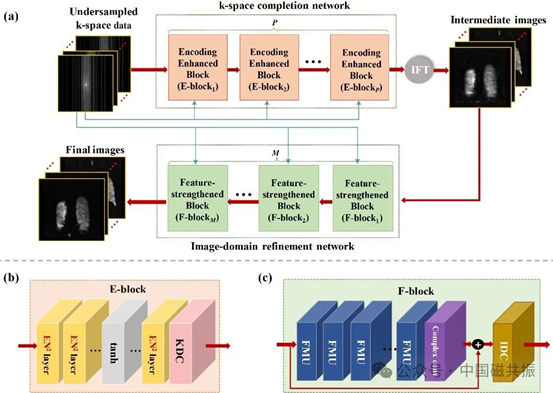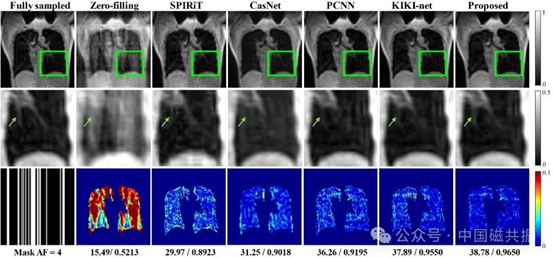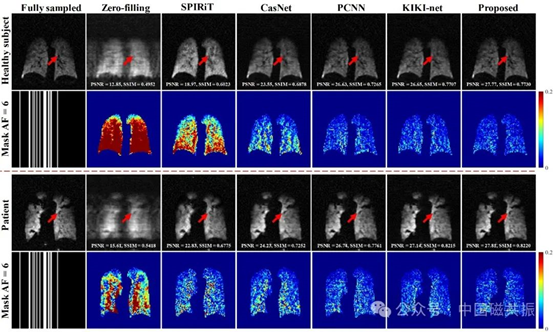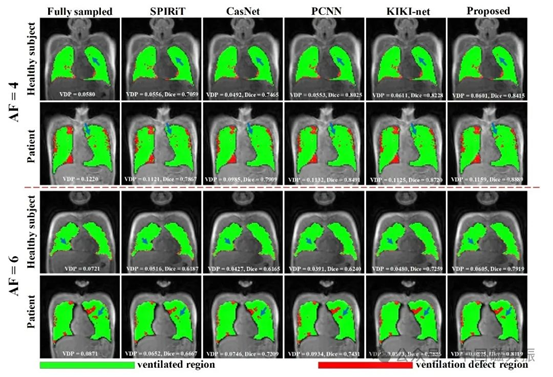

Ultrasensitive Magnetic Resonance Research Group proposed an Encoding Enhanced Complex Convolutional Neural Network (EN2C CNN) in the field of magnetic resonance imaging, achieving ultra-fast and accurate imaging
Recently, the Ultrasensitive Magnetic Resonance Research Group has made new advancements in the field of Magnetic Resonance Imaging (MRI). They have proposed an Encoding Enhanced Complex Convolutional Neural Network (EN2C CNN) which significantly reduces the imaging time of MRI. This method achieves a 6-fold acceleration compared to current clinical methods, with reconstruction times reaching the millisecond level, enabling ultra-fast and accurate imaging. The related research was recently published online in the prestigious medical imaging processing journal "IEEE Transactions on Medical Imaging".
In the field of imaging, the original data obtained from imaging technologies such as optical imaging and CT are real-valued, whereas MRI, due to its unique imaging principle, obtains complex-valued raw data, consisting of real and imaginary parts (which can be represented as a + bi), providing richer information than real-valued data. Therefore, the research group has studied the characteristics of MRI complex-valued signals and developed an efficient imaging method unique to MRI. Tracing back to the origins, the reason for MRI raw data being complex-valued is that MRI applies phase encoding and frequency encoding during signal acquisition to differentiate signals from different spatial locations. Convolutional Neural Networks (CNNs) are deep learning models that extract local features from data through convolutional layers, capable of extracting key information from large-scale data. Based on these considerations, the research group proposed a novel Encoding Enhanced Complex Convolutional Neural Network (EN2C CNN), capable of extracting features from complex-valued data along the MRI encoding direction, enhancing the learning performance of complex-valued data. At the same time, maximizing the utilization of MRI encoding correlation and integrity improves MRI imaging speed and accuracy, ultimately achieving ultra-fast and accurate imaging effects.
The specific framework of EN2C CNN is shown in Figure 1. Experimental findings (as illustrated in Figures 2-4) reveal that existing methods fail to meet clinical diagnostic standards when the acceleration factor reach 6 (i.e., only 16% of the fully-sampled data are acquired). In contrast, EN2C CNN consistently produces high-quality images even at high acceleration factors, maintaining clinical parameter consistency with fully-sampled images. Additionally, EN2C CNN achieves millisecond-level reconstruction times, facilitating real-time reconstruction requirements. This method is expected to facilitate the application of MRI in clinical scenarios that require rapid imaging, such as in the diagnosis and treatment of critical illnesses.

Figure 1. Framework of Encoding Enhanced Complex Convolutional Neural Network (EN2C CNN).

Figure 2. Pulmonary 1H MR images reconstructed at an acceleration factor of 4.

Figure 3. Pulmonary 129Xe MR images reconstructed at an acceleration factor of 6.

Figure 4. Ventilation defect segmentation results of pulmonary 129Xe MR images reconstructed at acceleration factors of 4 and 6.
This method is developed based on the "VerImagin uMR 780(Xe)" human lung gas multi-nuclear magnetic resonance imaging equipment independently developed by the research group led by Xin Zhou. This equipment has been granted the world's first Class III innovative medical device of its kind and has been applied in numerous top-tier hospitals across China, including Beijing 301 Hospital, Shanghai Changzheng Hospital, and Wuhan Tongji Hospital, to conduct clinical research on diseases such as chronic obstructive pulmonary disease (COPD), lung cancer, and COVID-19 pneumonia. With further promotion in clinical applications, this equipment will be used in more hospitals nationwide, providing services for the health and well-being of the general public.
The study titled "Encoding Enhanced Complex CNN for Accurate and Highly Accelerated MRI" was published in the IEEE Transactions on Medical Imaging. It was completed by PhD candidate Zimeng Li and associate professor Sa Xiao (co-first authors) under the guidance of professor Xin Zhou (corresponding author) at the Innovation Academy for Precision Measurement Science and Technology. This work was supported by the National Key Research and Development Program and the National Natural Science Foundation of China.

Innovation Academy for Precision Measurement Science and Technology, CAS.
West No.30 Xiao Hong Shan, Wuhan 430071 China
Tel:+86-27-8719-8631 Fax:+86-27-8719-9291
Email:hanyeqing@wipm.ac.cn
鄂ICP备15017570号-1